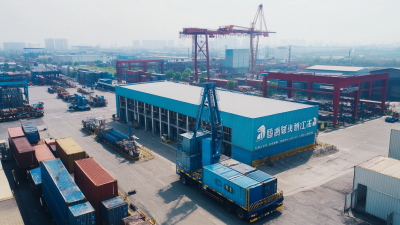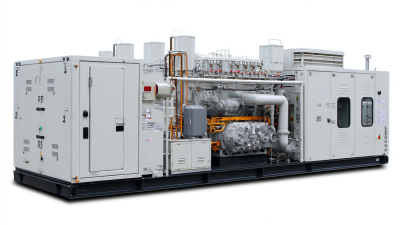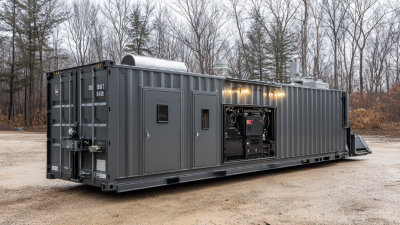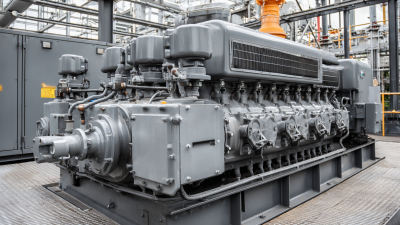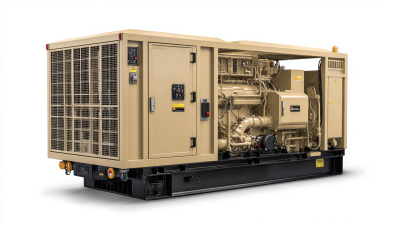
-
Home
-
Products
-
Service
-
About Us
-
Solution
-
Videos
-
News
-
Contact Us
Leave Your Message

Choosing the right Generator Set for your business is a critical decision that can significantly impact your operations. With a wide variety of options available, it's essential to understand the key factors that will ensure you select the most suitable generator to meet your specific needs. From assessing your power requirements to considering fuel types and maintenance aspects, making an informed choice can enhance efficiency, reduce costs, and provide reliable backup power when you need it most. This guide outlines the seven best ways to navigate through the complexities of selecting the perfect Generator Set, ensuring that your investment aligns with both current and future business demands. Whether you're running a small startup or managing a large-scale operation, understanding these key elements can help you make a strategic decision that supports your business continuity and growth.

When selecting the right generator set for your business, understanding your power needs is paramount. The first step in this process is to assess your load requirements. You need to identify all the electrical appliances and equipment that will be powered by the generator. This involves compiling a comprehensive list of all devices, including lighting, heating, cooling systems, and any machinery essential for operations. Once you have this list, calculate the total wattage needed during peak usage. Remember that some devices require a surge of power when starting, which should also be factored into your calculations.
Another crucial aspect is to consider the duration for which you anticipate needing power. Will the generator be used for continuous power supply or only during outages? This will impact the generator's capacity and fuel consumption. Additionally, understanding your peak and average load can aid in selecting a generator that not only meets your immediate needs but also allows for future expansion. By carefully assessing these aspects, you can choose a generator set that ensures your business runs smoothly without unexpected shutdowns or overloads.

When considering the right generator for your business, understanding the various fuel types is crucial. Diesel generators are known for their reliability and efficiency, making them a popular choice in many industries. According to recent industry analysis, diesel generator operating costs are projected to stabilize, despite fluctuations in fuel prices. However, the market for light diesel oil is expected to grow, with a valuation reaching approximately USD 234.6 billion by 2025, indicating a sustained interest in diesel power solutions.
On the other hand, gas generators offer an alternative that is often more environmentally friendly and generally cheaper to operate than their diesel counterparts. The shift towards renewable energy sources is gaining momentum, as projects worldwide are being funded to advance these technologies. For instance, some initiatives in Nigeria have been awarded funding to explore cleaner alternatives to fossil fuels, signaling a potential shift in generator preferences.
Tips:
When selecting the ideal generator set for your business, one crucial decision revolves around the choice between mobile and stationary options. According to a recent report from the International Energy Agency (IEA), demand for portable generators has surged by 35% in the last five years, largely driven by businesses needing flexibility during power outages or events. Portable generators offer convenience, allowing businesses to take power wherever it’s needed, making them particularly suitable for construction sites, outdoor events, or temporary setups.
On the flip side, stationary generator sets come with the advantage of higher power output and reliability for businesses that require a consistent energy supply. According to the 2022 Market Research Study by Global Industry Analysts, stationary generators accounted for nearly 60% of the total generator market due to their ability to handle larger loads and longer operational times without the frequent refueling required by portable units.
**Tips:** When considering portability, assess your business needs for mobility versus stability. If you frequently change locations or have variable power needs, a mobile unit might be your best option. However, if your operations are fixed and demand reliability, investing in a stationary generator could offer long-term savings and efficiency. Always ensure that any selected generator complies with local regulations and safety standards to avoid future complications.

When selecting a generator set for your business, evaluating fuel efficiency is crucial for minimizing operational costs. Different types of generators—diesel, natural gas, and propane—come with varying fuel efficiencies. Diesel generators are known for their longevity and efficiency, often providing more power per gallon of fuel. This makes them a popular choice for businesses with high energy demands. Conversely, natural gas generators may offer cost advantages in areas with lower fuel prices, though their fuel consumption can be higher.
Tips for improving fuel efficiency include regular maintenance of your generator to ensure it runs at optimal levels. Routine checks on air filters, oil levels, and fuel injectors can prevent costly breakdowns and ensure maximum efficiency. Additionally, consider load management strategies to avoid overloading your generator, which can lead to increased fuel consumption.
By carefully assessing your energy needs and understanding the fuel efficiency of different generator types, you can make informed decisions that will benefit both your budget and the environment. Choosing a generator that aligns with your fuel consumption goals can lead to significant long-term savings.
This chart compares the fuel efficiency of different generator types measured in grams per kilowatt-hour (g/kWh). Diesel generators are relatively efficient, while gasoline generators show higher consumption. Alternative fuels like propane and natural gas fall in between, whereas solar generators have the best fuel efficiency due to their renewable nature.
When selecting a generator set for your business, one of the most critical factors to consider is maintenance and support. Regular maintenance is essential for ensuring the longevity and performance of a generator. A recent study indicates that businesses can experience up to a 30% increase in operational efficiency with a well-maintained generator, showcasing the importance of routine checks and timely support. This is particularly relevant in the context of increasing reliance on power systems as industries expand, such as with the recent surge in AI data centers, where power demands have intensified substantially.
Furthermore, the implications of neglecting effective maintenance can be severe, resulting in unexpected downtime and repair costs. Reports have shown that unplanned outages can cost businesses approximately $100,000 per hour, emphasizing the need for proactive maintenance strategies. Selecting a generator set that comes with robust support services not only mitigates risks but also ensures that businesses can adapt to the growing power requirements spurred by innovations in technology and energy systems, like offshore renewable energy projects that demand reliability and efficiency. Prioritizing these factors will ultimately ensure optimal performance and sustainability for your power needs.
| Criteria | Description | Importance Level |
|---|---|---|
| Power Requirements | Determine the total wattage needed to run your essential equipment. | High |
| Fuel Type | Choose between diesel, natural gas, or propane based on availability and costs. | Medium |
| Run Time | Consider how long the generator will need to run without refueling. | High |
| Maintenance Support | Evaluate options for ongoing maintenance and availability of service technicians. | High |
| Portability | Determine if you need a stationary or mobile generator based on your business needs. | Medium |
| Noise Level | Consider how loud the generator will be and if it complies with local regulations. | Medium |
| Budget | Assess the upfront costs versus long-term operating expenses for the generator. | High |
